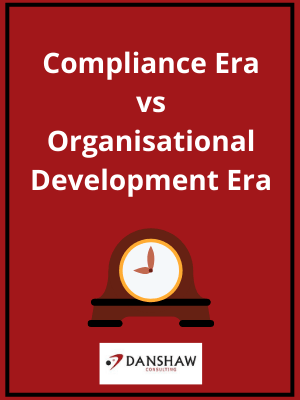Compliance Era vs Organisational Era

Compliance Era vs Organisational Development Era
By Charne Opperman (03/10/2019)
South African (SA) legislation and the strict guidelines associated with it have, over recent years, forced business owners into a ‘one size fits all’ environment. This over-generalisation constitutes a major disregard for the complex nature of an individual organisation and its development.
SA workplace and employment practices have long been debated. For example, how do we ensure equal pay for equal work? How do we address the wage gap, reasonable accommodation, affirmative action or equity? The human capital reality of this is that all these elements or issues we face within the SA framework must be interpreted, measured and implemented based on each organisation’s unique operational requirements and circumstances.
During the first quarter of 2019 the SA economy shrank by 3.2%, which marks the biggest decline since the global financial crisis (c.2008). This news comes as a double-blow after the SA economy expanded only 0.8 percent in 2018 and thus failed to meet market expectations of a 1.6 percent growth. Research indicates that the main contributing factors causing SA companies to fail are:
- Cash flow problems
- Insufficient need for products or services
- Not having a competent team on board
- Retention of good and competent workers
This begs the question- how will compliance contribute towards the growth and sustainability of businesses in SA?
SA compliance strategies such as the Employment Equity Act, the Broad-Based Black Economic Empowerment and the Skills Development Act has been developed for employers operating within the private as well as public sectors. These sectors fundamentally differ from each other in both operating procedure and structure. Both these sectors are equally affected by the strict compliance elements within SA, where the aim and focus should be placed on creating a pool of competent employees. Strict compliance regulations regarding race, gender and diversity within SA poses challenges in building a competent workforce. Not only does this affect employees but similarly so the bottom line of businesses. The importance of having a diverse workforce cannot be disregarded but should not be the only determining factor. Having a diverse workforce without the adequate skills and experience adversely impacts organisational function.
Thus, organisations need to select individuals who meet the specific requirements and skills necessary of a job whilst still considering gender, race and diversity. For example, where there are two employees with the same skill set and experience, preference should be given to previously disadvantaged or minority groups. By doing this, organisations ensure a well-functioning, yet sustainable model for the future.
SA’s strong compliance era shifted the focus from processes and structures intended to help business owners. A merge between compliance and development is needed to ensure continuous growth and development, which in turn leads to the development and maintenance of an effective and efficient workforce.
Sustainable growth and development of businesses should become an integrated and on-going process. Focus should be placed on the planning, adjustment and improvement of relationships in an effort to position competent organisations to best be able to react to operational needs for change.
In order to compete globally, SA businesses should aim to follow global business trends, specifically modern HR capabilities and roles. Businesses should shift their focus to interventions and processes that can add value to a well-structured organisational development initiative. SA organisations need to follow well-researched interventions intended to increase their ability to make the best workforce related decisions. Examples of such interventions include:
- strategically reducing labour costs;
- targeting specific and identified inefficiencies;
- identifying skills gaps and areas of succession risks.
Improved talent and people development are therefore key elements in workforce planning. If done properly they ensure the adequate supply of skills, knowledge and experience required to achieve strategic business objectives efficiently and effectively.
In conclusion, it is important to understand that for South African businesses to become more sustainable and profitable, the sole focus of the compliance era should be shifted to accommodate for the organisational development era, thereby shifting the focus to creating and developing a competent and sustainable workforce.
For more information, see:
https://www.preferredcfo.com/cash-flow-reason-small-businesses-fail/
https://www.businessinsider.com/why-small-businesses-fail-infographic-2017-8?IR=T









